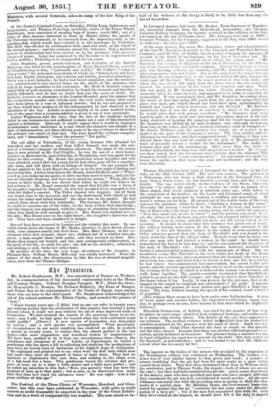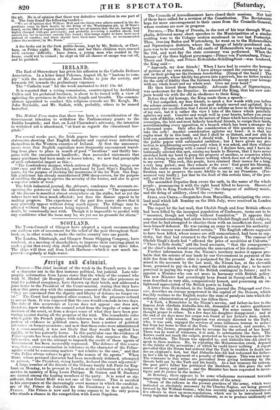T mom.
Mr. Robert- Stephenson, M.P., was entertained at' Bangor on Wednes- day, in commemoration of- his suctessful engineering feats at the Menai and Conway Straits. Colonel Douglas Pennant, M.P., filled the chair ; the Honourable L. Mostyn, Sir Richard Bulkcley, -the Dean of Bangor, and Nubar Bey as the representative of the Pasha of Egypt, were among those who sat near to the chief guest. Mr.-Stephenson acknowledged the aid of his valued assistant Mr. Edwin Clarke, and sounded the praises of "iron e "About twenty years ago—I think that no one can refer to twenty years ago without feeling that the civilization of this country had reached a point beyond which it could not pass without the aid of some improved mode of locomotion. We had strained the muscle of the generous horse to its ut- most; may I add, we, had gone far beyond what any well-cultivated mind could justify ? (Cheers.) A new species of locomotion was demanded by society ; and a new species was accomplished. What peculiarity or circumstances in our social condition has rendered us able, in so short a period as twenty years, to realize this, the almost. perfect to the last degree—this most stupendous and beneficial system of improvement ? We have beer. enabled to do it from one circumstance alone—that is, the abundance and cheapness of iron." Lately, at Copenhagen, he visited a gentleman who has spent a life in collecting and studying the productions of roan from his lowest-state of barbarism to his -highest stage of civilization. " He explained and pointed out to me what were the first tools which man had used—they were all composed of bones or -hard stone. They had no hatchets or implements like ours then, and nothing in the shape even of a fish-hook but a bone. This gentleman traced the advance and pro- gress of man, up to a state a little nearer and a little more perfect ; and he called my attention to this fact—',Now, you perceive what has been the progress of man up to that point ; but as soon as he discovered iron, mark after that time how rapid his, advances were.' He was right : iron is the great eivilizer of-this age."
The Festival of the Three Choirs of Worcester, Hereford, and Glou- cester, has this year •been celebrated at Worcester, with quite as much success as could reasonably be expected in the year of the Great Exhibi- lien and in .a week of comparatively wet weather. Thee= raised on be- half of the widows of the clergy is likely to be little less than any ob- tained heretofore.
At Liverpool Assizes, last week, Mr. Rooker, Town Surveyor of Manches- ter, recovered damages from the Birkenhead, Lancashire and Cheshire Junction Railway Company, for injuries received in the collision at the Sut- ton tunnel on the day of Chester races. The damages were laid at 50001. ; Sergeant Wilkins, for the Company, suggested to the Jury that 10001. would be sufficient ; the Jury gave 1500/.
At the same Assizes, this week, Mrs. Saunders, widow and administratrix of the late W. Saunders, Secretary to the Limerick and Waterford Railway Company, sued the City of Dublin Steam-packet Company for damages on account of the death of her husband, on the 1st of December last. Mr. Roebuck, Q.C., stated the incident out of which the action arose. " Mr. Saunders was coining to England on the 1st of December, by the Eblana, one of the vessels of the defendant company. During, the passage, a severe gale was blowing, a heavy sea running; and Mr. Saunders was, amongst other passengers, very sick below. Bat on the arrival of the vessel towards Holyhead, the sea became less, as she rounded behind the pier, because the wind came off the land. When the vessel arrived it was very dark ; and when she was about 300 yards from the place where she was eventually moored, the gangway-door of ti e vessel was removed and open. While this was going on Mr. Saunders was below. Shortly afterwards, in a few moments after, he came on deck, and appeared to be tying or adjusting his neckerchief. It was exceedingly dark, and Mr. Saunders,in coming along, the vessel at that time being 300 -ards from the pier, not seeing that that place was open, and which should not have been open, unfortunately for himself and family, walked overboard, and was drowned." Mr. Roebuck understood that it was the duty of somebody to stand at the gangway ; he would allow that such person was there. " Mr. Saunders went over- board in spite of that small and ridiculous precaution, instead of the rule being observed of keeping the gangway shut till the vessel was made fast.- Mr. Saunders .was picked up by some boatmen, and, although he had not been long in the water, died before medical mg:shiner: could be brought in." Mr. Justice Williams said, the question was simply one of neglect or no neglect on the part of the Company's service. The Jury retired, and de- liberated for two hours; and then reappeared toask, " whether, if they con- sidered there was any want of caution on thepart of Mr. Saunders, they must of .necessity return a verdict for the defendants." The Judge re- iterated that part of his summing-up. After more than two hours of further deliberation, the Jury were still unagreed on a verdict. Mr. Cromp- ton then stated, that the defendants were anxious that the widowed Mrs. Saunders should have " some remuneration." An agreement was made be- tween the parties on that basis—the sum not mentioned ; and the Jury were dismissed.
Thomas Threlfall has been tried at Liverpool for the murder of his first wife, on the 16th October 1832. The case was curious. The prisoner is a Policeman, who has borne a high character in the Liverpool force for more than a dozen years : lie has married a second time, and has a large family. The case rested chiefly on the evidence of one Shaw, who came forward "to relieve his mind" of a burden he could no longer bear. Shaw stated, that about eighteen or nineteen years ago, while asleep in the canal-boat of his brother, on the Leeds and Liverpool canal, at about midnight he was awakened by hearing a sealing and screeching. Ile heard a woman cry for help. lie peeped out of the scuttle-holes of the bout, and saw the prisoner, whom he knew, "ducking a woman in the canal." Presently the woman "scratched at the stern of the boat, and moaned." One of Kenworthy's fly-boats was coming down, and he said to the prisoner, "Now thee must run, or else be taken"; and the prisoner ran away. Beck- ett, the driver of the-fly-boat, ran after him, but returned without catching. him. Shaw was in terror, and did not move out till seven o'clock in the morning. It should be stated that this evidence was given out of court ; the witness having been taken ill the day before, and removed to the hospital : it was not therefore subject to the ordeal of cross-examination- Other witnesses proved that the body of Threlfall's wife was found in the canal about the timed the alleged crime. Beckett swore that he never ran after any man who had ducked a woman in the canal : he should have remembered the fact if he had done so; and he remembered the discovery of the body of Threlfall's wife. Further witnesses, however, recalled facts having a circumstantial connexion with the statements of Shaw. One re- membered seeing Mrs. Threlfall on the week before her death at the house where she was a servant ; and remembered that her husband, who was sepa- rated from her, came and invited her to return to hint and live in a cottage he had taken : they remembered her conversation, her ,assent to his pro- posals, and the mutual appointment of the two to meet on the canal-bank on the evening of the day on which it is believed the woman was drowned, and walk home together. The parish-constable recollected that Threlfall ob- jected to go aud see his wife's corpse; and that he had to draw Threlfall to the house where it lay. Lastly, it was proved,, for the prisoner, that ut the inquest on the-corpse no suspicion was entertained rf his guilt. A number of clergymen and persons of local station now gave Threlfall a high cha- racter. The Jury, without hearing the speech of,his counsel, found a verdict of acquittal. [The witness Shaw seems to have been under sonic hallucination. A mats of weak mind and unsober habits, his imperfect recollections, vague fan- cies, or perhaps even dreams, have become to him facts which be implicitly believes.]
Elizabeth Swinnerton, of Salford, was tried for the murder of her step- daughter, by cruel usage—denial of food, continual beatings, and confinement
in a damp cellar during illness. 'The details the case have appeared in ce our columns. The medical evidence failed tablish that the undoubted cruelties practised by the. prisoner were the cause of death : death was due to. consumption. Judge Platt directed the Jury to acquit on this ground, and the Jury obeyed. It seems that there was another sufficient ground of ac- quittal, purely technical in its nature. The prisoner being a married woman, no legal obligation lay upon her to provide for the child : that duty rested on the husband, as paterfamilias ; and he was bound to see that the child re- ceived what was necessary for her.
The iequest on the bodies of the miners,who perished by. the explosion in the Washington colliery was continued on Wednesday. The further evi- dence was of very similar tenour to that given last week ; a number of miners testifying that the pit had been for some weeks in a state which caused them alarm. They had often mentioned their fears to William Ilan, tho overlooker, and to Thomas Todds, the deputy—both of whom are among the real ; but they had both considered the pit safe : and it seems that others of the miners, some who have perished and some who have escaped, although they considered the.pit was foul, yet believed it would not fire. All the new witnesses concurred also with the preceding ones in giving to Hall the cha- racter of a careful Juan. Mr.,-Matthias Dunn, the Government ,Iaapector, stated his opinion that the pit " certainly did not come under.the, denomi- nation of. a liery pit" ; but if the men had acquainted him.with the facts they have states tti.the inquest, ,he,abotild have felt at his. fiuti.1.0 ihapect
the pit. He is of opinion that there was defective ventilation in one part of it. The Jury found the following verdict-
" We are of opinion that William Hall and the thirty-two others named in the de- positions came by their deaths by the Bring of the Washington pit, in M'Nare's board, on the lath of August instant; and we are of opinion that the air, having been highly charged with gas previously, and probably receiving a sudden check, had caused the lire to increase outside this board ; that lamps ought to have been used instead of candles ; and there should have been more brattice, as recommended [since the accident] by Mr. Dunn."
A fire broke out in the Cock public-house, kept by Mr. Baldock, at Chat- ham, on Friday night. Mrs. Baldock and her three children were rescued with extreme difficulty. Isaac Amos, a young man who resided in the house, could not be roused ; he slept on till all chance of escape was cut off, and he perished.



























 Previous page
Previous page